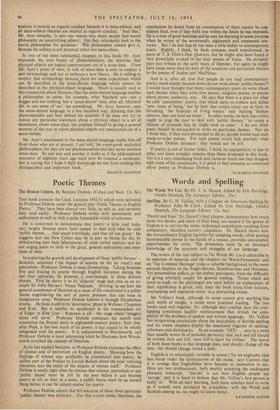Words and Spelling
The Words We Use. By Dr. J. A. Sheard. Edited by Eric Partridge. (Andre Deutsch, The Language Library. 21s.) `PROFIT and Loss,' Dr. Sheard's final chapter, demonstrates how much these two books, and more of their kind, are needed if the genius of English is to survive the loose, undirected assimilation resulting from compulsory, therefore cursory, education. Dr. Sheard shows how the extraordinary English capacity for adopting words, while putting incomparable power in the hands of a master, provides unexampled opportunities for error. The protection must be an increased knowledge of the structure and strengths of our language.
The review of the vast subject in The Words We Use is admirable in its selection of material, and the chapters on ' Word-Formation' and on 'The Common Heritage' make a valuable background to the more assured chapters on the Anglo-Saxons, Scandinavians and Normans. Yet presentation suffers, as the author anticipates, from the difficulty of giving scholarly results for general reading. Terms which are stock-in-trade to the philologist are used before an explanation of their significance is given; and, since the book arose. from lectures, overlapping and repetition occur to a distracting extent.
Mr. Vallins's book, although its scope cannot give anything like such depth of insight, is 'much more practical reading. The two books read well together, for, although they overlap, here the over- lapping constitutes healthy reinforcement that reveals the com- plexity of the problem of spoken and written language. Mr. Vallins has invigorating conclusions about the desirability of flexible spelling and his wisest chapters display the emotional vagaries of spelling- reformers and dictionaries. As an example, 'OED ... says in a more than usually severe fit of pedantic perversity that Jack and Jill should be written Jack and Gill, since Gill is short for Gillian.' The moral of both these books is that language does, and should, change all the time; but should change round a pole.
English is so notoriously variable in sound (' for Ave englysshe men ben borne vnder the domynacyon of the' mone,' says Caxton) that it is strange that Englishmen have become so insensitive in ear. Here are two professionals, both meekly accepting the inadequate phonetic transcript. Stevidz' is not how English people say 'savage,' and it is hard to believe that Mr. Vallins's first person is really 'el.' With all their learning, both these scholars tend to write as if sounds were produced by a machine; with the Welsh and Scottish among us, we ought to know better.


































 Previous page
Previous page